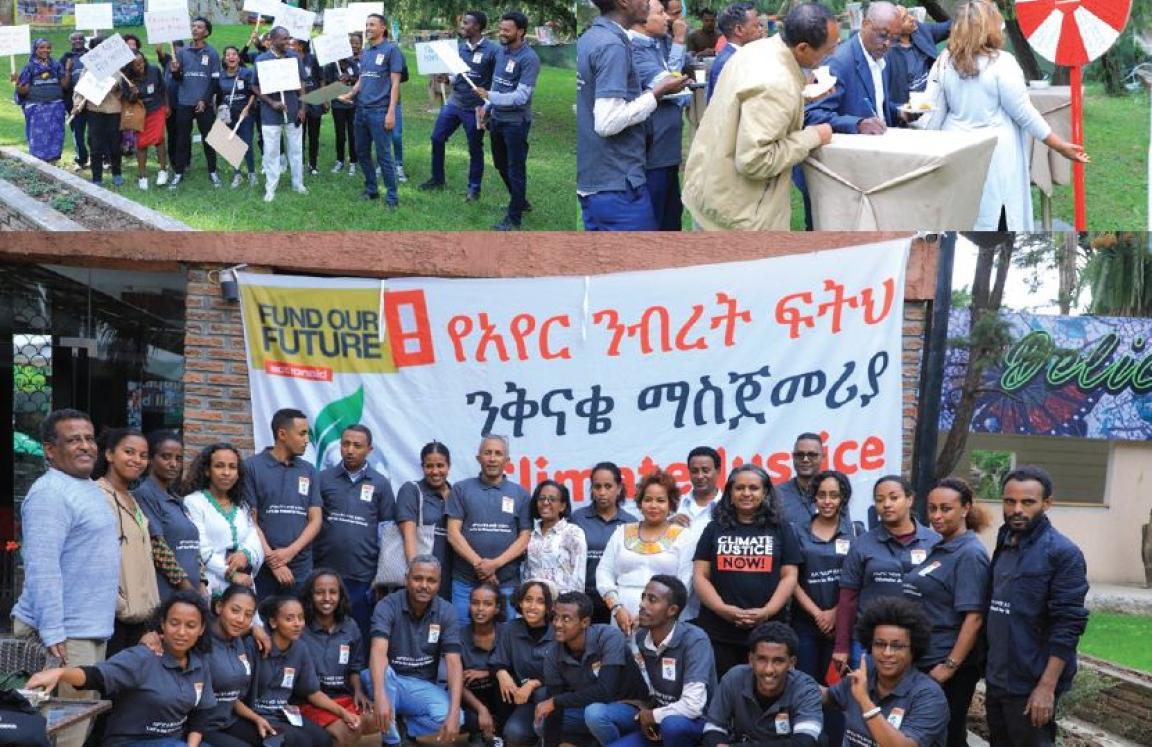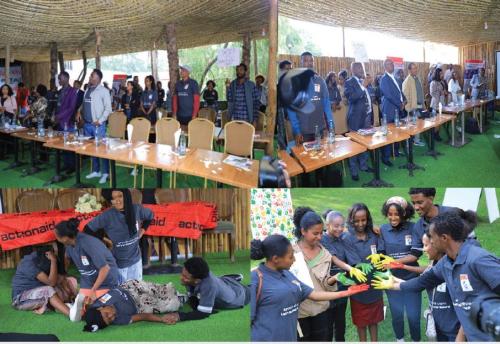
Land and climate
ActionAid Ethiopia called up on the global polluting powers to pay attention to the rapidly deteriorating climate that is devastating the lives of world population.
In the national Climate Justice Campaign launching event aligned with ActionAid’s global campaign with the motto #Fund_Our_Future held in Addis Ababa
on October 16,2023, panellist scholars in the event stressed that the Global North is solely accountable for the horrifying climate crises and responsible to fund climate-friendly human activities, especially agroecology or eco-friendly agriculture to save our world and its population. In her opening remark, ActionAid Ethiopia’s Country Director, Tinebeb Berhane, stated that fossil fuel and industrial agriculture are the major causes of climate crises such as
drought, flood, desert locust invasion, displacement, and migration that lead to conflicts; and that it is the Global South countries that bear the whole suffering despite their zero or insignificant contribution for the crises. She also said that the developed countries have not kept their promises to decrease their climate damaging activities and to fund climate resilient initiatives. New research by ActionAid shows that ‘’banks have provided an annual average of 20 times more financing to fossil fuel and industrial agriculture than Global North governments have provided as climate finance to countries on the frontlines of the climate crisis.’’
Communities coming from Borana, Raya, and West Shoa areas that have been severely impacted by Climate Crises like drought and flood gave witnessing stories about the suffering their communities have faced and the supports they got from ActionAid Ethiopia during the emergencies. During the campaign launch, volunteer young people and members of Global Platforms Ethiopia working with ActionAid Ethiopia staged a short drama showcasing the destructive and criminal practices of humankind and their devastation effects on the lives of millions on planet Earth.
As part of the launching of climate justice campaign, areas and communities affected by flood in Ejere woreda of Western Shoa were visited to eyewitness the damage and express solidarity with the people affected.
Professor Belay Simane is a Professor of Environmental Studies and Agricultural Development at Addis Ababa University (AAU). He is also a fellow of the Ethiopian Academy of Sciences. He is currently serving as a Multi-disciplinary Expert Scientific Advisory Group (MESAG) member for UNEP and a Member of the National Panel of Experts for the Grand. In his presentation on the causes and solutions of the concurrent climate change and
crisis, after giving elaborations on tangible evidence and acclaimed research findings, he forwarded major measures that all stakeholders should take to mitigate climate change.
Dr. Hailu Araya - PELUM Ethiopia Consortium, Executive Director Dr. Hailu Araya is a Soil Scientist, Organic Soil. He has worked more than 15 years in the
Institute for Sustainable Development (ISD) and more than 7 years in PELUM Ethiopia. Dr. Hailu's experience falls predominantly under smallholder managed farming system. He brought his practical experiences and views on how agroecology can contribute to mitigate climate change and mechanisms to develop climate change-resilient, gender inclusive, and bio-diversified livelihood in Ethiopia. The following were the major views and
recommendations he presented: We could observe that it is smallholder farmer that became conscious of the trend in climate change occurrence seventy and eighty years earlier than elites or scientists of the sector. For years, smallholder farmers applied homegrown climate change coping and adaptive mechanisms on their farmlands to feed themselves and us to this day. To the contrary, what governments and scientists are used to is investing on research or relief activities that hardly contribute to the sustainable life of farmers, pastoralists, and nation at large. So, we must give recognition and respect and be thankful to the farmers and pastoralists for their irreplaceable contribution to climate change adaptation (Participants stood and applauded when he stated this).
Dr. Yitebitu Moges has been trained in forestry science, tropical forestry, and forest ecology for his studies. He works now for Ethiopian Forestry Development (EFD) as National REDD+ Coordinator, in which he has played a key leadership role in the design of several bankable forestry projects and has enabled the mobilization of over 150 million USD from There is nothing better climate change coping mechanism than Agroecology which
mainly comprises of establishing healthy and fertile soil by applying only organic matters, diversifying farm produce, and plant protection. All these methods can be applied by giving recognition to the indigenous knowledge and wisdom of smallholder farmers, pastoralists, and semi-pastoralists in all eco systems. Women are best practitioners of inside approach (home gardening) by which they grow diverse vegetables, spices, medicinal plants and other commercially needed plants in their backyards. This practice empowers women, children, and disabled persons economically and ensures their food security, balanced diet/nutrition, and decreases stress at family level. This inside approach can also be scaled up to outside approach (field farming) by men farmers too to broaden climate change resilient livelihood. It is highly suggested if such events could be held nearby farmland to visit and
triangulate theories and says with farmers who are living and adapting to climate change. Ethiopia is well acclaimed as the pioneer to bring green policy by preparing Climate change Resilient Growth (CRG) as a global agenda in 2011. In that document, Ethiopia promised to reduce its carbon emision by 64% in 2030 in the condition that it gets 80% of the fiancial, technical and technological support the task requires from global sources. This was in addition to the adaptation works it was and is implementing to contribute to drop global warmth by 1.5degree celsious. In furtherance to this, it has ratified Nationally Determined Commitment (NDC) in 2021 by improving its promise of reducing carbon emission to 70% by 2030 if it gets the support from the developed world. Dr. Yitebitu gave broad explanation on the leading roles Ethiopia played the commitments it entered globally to reduce climate change crisis including mitigation and adaptation. Put in brief, these were the major explanations he gave: Dr. Yitebitu’s presentation and views covered three major areas, namely, 1) the implementation status of Nationally Determined Contribution (NDC) which Ethiopia has ratified to reduce climate change crisis; 2) The contribution of NDC to reduce climate change crisis and to ensure climate justice; and 3) How we can we achieve climate justice based on human rights based apparoach in Ethiopia. Ethiopia is well acclaimed as the pioneer to bring green policy by preparing Climate change Resilient Growth (CRG) as a global agenda in 2011. In that document, Ethiopia promised to reduce its carbon emision by 64% in 2030 in the
condition that it gets 80% of the financial, technical and technological support the task requires from global sources.
W/ro Mihret Teklemariam –Director, PETCO Ethiopia W/ro Mihret has M.A. degree in Development Studies, and she is Circular Economy specialist. Wro. Mihret presented on urban environment protection as well as on initiatives to build up women’s resilience to climate change crisis and adaptation. When we think of urban environment protection, what comes to our mind is population growth in urban areas and industrialization. Ethiopia’s CRG national strategic documents stipulate its commitment to realize green and resilient economy and to develop green or smart and sustainable cities. National Solid Waste Management and Circularity Strategy which the country has developed recently for the first time gives emphasis on shifting resource utilization
from the old-fashioned linear (use and throw or take-make-dispose) approach to sustainable circularity approach which promotes reusing and recycling natural resources to build up circular economy. In connection with National Solid Waste Management and Circularity Strategy, a directive entitled Extended Producers’ Responsibility (EPR) which forces industries to shape all their production, packaging, and distribution processes with circular thinking is being drafted. There are encouraging waste to wealth initiatives implemented by different actors like civil society organizations, corporate industries, and private sectors including the government. Some volunteer producers and businesses have shown commitment to invest on circular economy by creating environment protection-centred green jobs (solid waste collection and recycling) in big cities like Addis Ababa, Hawassa, Bahirdar,
and Diredawa. There are also initiatives that integrate organic waste composting with urban agriculture/greening in these cities. 80% of the workforce in waste management are women. However, these women are not benefiting from the contribution they make due to low wages and inability to upgrade their occupation as most of them are not literate. Even though there are few women economic empowerment initiatives in some cities, these are a After the presentations by the invited panelists, participants were given the chance to raise questions and reflections in relation to climate change, early warning, impacts of climate change on lives of urban and rural communities, integrating top down and bottom-up approaches and others. All questions were addressed, and reflections noted.
For more on this article please click on the link below or you can find it on our Website under "Publications"
https://ethiopia.actionaid.org/publications
